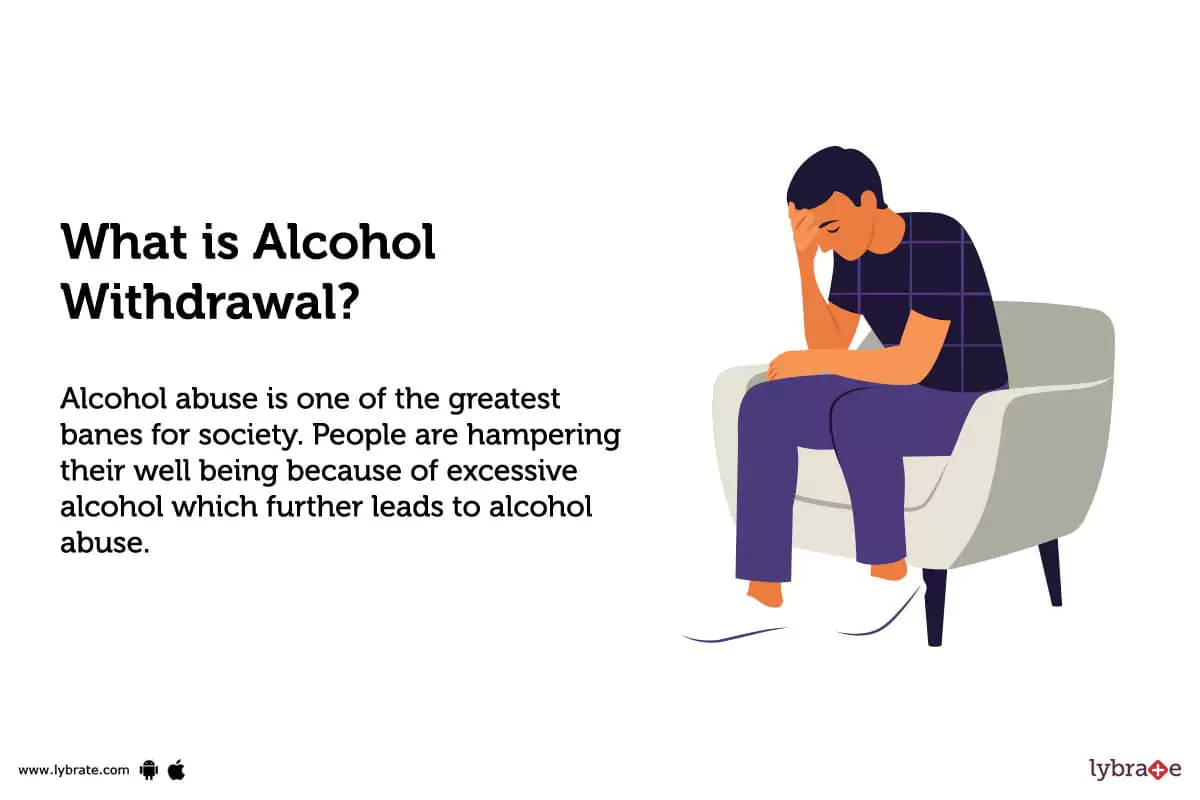Alcohol Withdrawal: Causes, Symptoms, Treatment, and Cost
Last Updated: Jul 07, 2023
What is Alcohol Withdrawal?
Alcohol abuse is one of the greatest banes for society. People are hampering their well being because of excessive alcohol which further leads to alcohol abuse.
If you give up alcohol or significantly reduce your alcohol use after heavy drinking over days, weeks, or years, you might experience severe physical and psychological issues. We refer to this as alcohol withdrawal.
There are moderate to severe symptoms. It's improbable that you'll experience withdrawal symptoms if you only drink sometimes. If you've once experienced alcohol withdrawal, you're more likely to do so the next time you give up.
Types of Alcohol Withdrawal
Alcohol withdrawal might cause serious threats to the body if medical help is not available. However it might be treated by identifying the symptoms and then applying the therapy or medication.
There are two types of withdrawal: acute withdrawal and protracted withdrawal. Acute alcohol withdrawal refers to signs like palpitation, seizures and even hallucinations.
This collection of ambiguous anxiety and depression symptoms known as the 'protracted abstinence syndrome' might include depressive moods, diminished focus, decreased energy, and reduced and poor sleep.
What causes Alcohol Withdrawal?
Alcohol has a depressing influence on the body, according to physicians. It alters how the nerves communicate back and forth and decelerates brain activity.
The central nervous system becomes accustomed to having alcohol available all the time. The body exerts a lot of effort to maintain the nerves communicating with one another and to make the mind more alert.
The brain remains in this hyperactive condition even when the level of alcohol abruptly decreases. The cause of withdrawal is that.
What are the symptoms of Alcohol Withdrawal?
Six hours following your last drink: As little as six hours after you put down your drink, mild symptoms can appear. They may consist of:
- Shaky hands,
- Migraine
- Nausea
- Vomiting
- Insomnia
- perspiring
12-48 hours after your last drink
hallucinations and seizures
48 to 72 hours after your last drink
- Confusion
- Fever and high blood pressure
- heavy perspiration
Alcohol withdrawal syndrome vs. a hangover
A hangover & alcohol withdrawal syndrome have different contributing factors. When someone consumes excessive alcohol at once, a hangover results.
If an individual with an alcoholism disorder quits drinking or drastically reduces their intake of alcohol, alcohol withdrawal syndrome develops. Even though it is uncomfortable, a hangover is neither harmful nor a sign that you might have a drinking problem.
However, withdrawal is a warning that your alcoholism has advanced to the point where it needs expert assistance.
You must immediately seek the advice of a doctor who specializes in addiction medicine if you experience symptoms of withdrawal when you stop drinking or reduce your use in order to develop a strategy for sustainable detox.
What are the Risk Factors of Alcohol Withdrawal?
Alcohol withdrawal comes along with certain key risk factors as well.
Excessive drinking over an extended period of time, a past of partial seizures, and a background of hallucinations and tremens are the key risk factors for acute withdrawal syndrome.
How can you prevent Alcohol Withdrawal?
It is necessary to prevent alcohol withdrawal in order to sustain a healthy life. People should definitely keep a check on their lifestyle patterns.
The greatest weapon against AWS is to refrain from frequent, excessive drinking. It's crucial to get counseling and professional assistance as quickly as you realize you have an addiction to alcohol.
To safely and progressively reduce your reliance on drinking so that you may get back to your normal routine.
What is Detox process
The very first phase of treatment is frequently thought of as detox. It will guide you through the challenging alcohol withdrawal process, but it won't eliminate the behavioral patterns that lead to alcohol usage.
Once you finish detox, a variety of treatment modalities and environments can assist in providing the continuing support necessitated for long-term abstinence.
Staying at a hospital for the treatment period while receiving 24 hour assistance and rigorous treatment in group and private sessions is known as inpatient or residential treatment.
Staying at home while receiving outpatient therapy entails scheduling regular sessions to attend group and individual psychological counseling. This enables you to put everything you learn in therapy into practise when handling pressures in the real world.
Additional post-detox options entail:
Treatments like cognitive behavioral therapy and family therapy (CBT).
12-step gatherings, like AA.
involvement in additional mutual cooperation organizations, like Smart Recovery.
free web virtual support conferences offered by AAC.
Dos’s
- Give your values top priority.
- Attend to your underlying medical conditions
- Participate in a medical detox programmes
- Eat nutritious meals that are balanced, and workout frequently.
- Remain hydrated.
- Maintain a regular sleeping routine.
- Consider joining a support network.
Don’t
Listed below are some drugs and foods that people in recovery from alcoholism should stay away from, especially in the beginning.
Over-the-Counter Medicines. Prescribed Medication. Foods packed with sugar, caffeine, additives, and preservatives. Stay away from alcohol and other such beverages.
Alcohol Withdrawal - Diagnosis and Tests
The doctor will inquire regarding your drinking background and also how lately you quit if they suspect you could be experiencing alcohol withdrawal. If you have ever been through withdrawal, they will wish to learn.
They'll talk about your symptoms as well. They will perform an examination to check for any further medical disorders that might be the cause.
Your doctor will do a physical examination. This could show:
- Inconsistent eye motions
- Irregular heartbeats
- Dehydration
- Fever
- Quickly breathing
- Quick heartbeat
- Unsteady hands
- It is possible to perform blood and urine tests, as well as a toxicology check.
What are possible complications of Alcohol Withdrawal?
Alcohol withdrawal can be a big impediment in a person's well being. There are certain complications that may result in alcohol withdrawal. These include:
- Being unable to fall asleep.
- Mood swings.
- Varying emotions.
- Aches and pains, stress, and depression.
- Cravings
- Exhaustion
Home Remedies for Alcohol Withdrawal?
There are various things that can be done to ensure that the procedure of withdrawal from alcohol is safer and more effective if you're doing it at home. These consist of
- When detoxing, always keep a companion
- For 14 days, free your calendar to give yourself enough time to properly detox.
- Make sure there isn't any alcohol easily accessible in the house.
- Drink a lot of water.
- Consume wholesome fruits and veggies.
- Stay away from those who might encourage you to consume alcohol.
- Try meditating, yoga, or other peaceful pursuits.
- Get a medical emergency plan in place in case severe symptoms appear.
What to eat in Alcohol Withdrawal?
Some meals can be helpful in alcohol withdrawal. Foods that can help in detoxification include:
- Fruits and vegetables:
- Whole grains:
- Foods containing vitamin B
- Proteins low in fat
- Cayenne pepper
- Omega-3 fats
What not to eat in Alcohol Withdrawal?
Diet plays a very important role in any syndrome, Similarly in alcohol withdrawal, certain food items may increase the problem.
Foods packed with sugar, caffeine, additives, and preservatives need to be avoided in alcohol withdrawal as they might pose serious problems.
Alcohol Withdrawal Treatments
You usually won't need anything other than a positive ambience to get you through, if you have a serious medical condition or you've already experienced severe withdrawals. That contains:
- A serene setting
- Low-key lighting
- Fewer interactions with people
- A mood that is upbeat and encouraging
- Eat well and drink plenty of water.
The doctor can advise you on the appropriate course of therapy if you choose to seek it.
Get emergency medical attention if your pulse rate, heartbeat, or body temperature increase, or if you experience more severe symptoms like convulsions or hallucinations. The doctor might advise hospitalization and pharmacological therapy.
Alcohol counseling might also be of great help.
Treatment typically entails:
Benzodiazepines to reduce withdrawal symptoms
A Blood test
The long-term problem of drinking will be discussed in patient and family counselling
Testing and care for various health issues related to alcohol usage
Which doctor to consult for Alcohol Withdrawal?
These specialists can be consulted for the treatment of alcohol withdrawal:
- Hospitalist
- Critical Care Doctor
- Psychiatrist
- Emergency Medicine Doctor
Which are the best medicines for Alcohol Withdrawal?
Benzodiazepines are often prescribed drugs to assist treat conditions like anxiousness, sleeplessness, and seizures. Besides other medications, patients may even consume antipsychotic drugs and anti-seizure medications.
Are the results of the treatment permanent?
People in recovery can be certain that certain brain processes will recover completely, while others might require additional work, based on a news piece on the restoration of behaviour and cognitive ability after alcohol withdrawal.
Who is eligible for the treatment?
Anyone exhibiting alcohol withdrawal effects, such as anxiety, agitation, sleeplessness, vomiting, nausea, and mood swings, is suitable for medication.
Who is not eligible for the treatment?
Alcohol withdrawal symptoms won't occur in those who don't drink heavily or gave up alcohol entirely at any stage, making them ineligible for therapy.
What are the post-treatment guidelines?
Standard treatment for alcohol withdrawal, recommendations may include opting to live in a calm atmosphere with low lighting, few social interactions, a good and encouraging surrounding, and plenty of nutritious foods and liquids.
What is the price of Alcohol Withdrawal treatments in India?
The cost of alcohol withdrawal treatment might vary as per the need of the patient.
It ranges between Rs. 500 to 5,000 starting from the doctor's consultation to the therapy sessions which might be of different durations for different patients.
What are side-effects of Alcohol Withdrawal treatments?
Despite the fact that certain withdrawal could seem to not require medical treatment, skipping medicine may occasionally have negative effects on any subsequent abstinence episodes.
Failure to properly treat withdrawal with drugs may cause a sort of neurotoxicity that, through a phenomena called 'kindling,' may increase the likelihood of patients having seizures after multiple abstinence episodes. Dependence to the substance occurs as a side effect of using benzodiazepines to treat alcohol addiction. The patient may grow addicted to benzodiazepines. Chlordiazepoxide's typical adverse effects include drowsiness, exhaustion, restlessness, headaches, skin rashes, irregular periods, etc.
How long does it take to recover from Alcohol Withdrawal?
The majority of people stop suffering symptoms of withdrawal in less than a week, at which point their bodies start to operate normally again and the level of well-being can indeed be noticeably better.
Certain sleep benefits start to happen as soon as 7 days, and they continue to grow the following week.
Alcohol Withdrawal - Outlook / Prognosis
The majority of AWS patients bounce back. The prognosis is typically positive if you are free from disease, can quit drinking, and can obtain help. Nevertheless, sleep issues, agitation, and exhaustion could last for weeks.
It may be lethal if AWS has progressed to delirium tremens. It's crucial to get medical help right away if you start to exhibit serious AWS symptoms. The earlier you start therapy, the greater the likelihood of avoiding potentially fatal consequences.
References
- Alcohol withdrawal- Medline Plus, NIH, U.S. National Library of Medicine [Internet]. medlineplus.gov 2019 [Cited 16 July 2019]. Available from:
- Mirijello A, D'Angelo C, Ferrulli A, et al. Identification and management of alcohol withdrawal syndrome. Drugs. 2015;75(4):353-365. PMID: 25666543. [Cited 16 July 2019]. Available from:
- Harmouche E, Steger C, Mikhaeil M, Hoffman RS. Treatment of Alcohol Withdrawal Syndrome. American Journal of Critical Care. 2019 Mar 1;28(2):96-99.[Cited 16 July 2019]. Available from:
Table of content
15+ Years of Surgical Experience
All Insurances Accepted
EMI Facility Available at 0% Rate
Find Psychiatrist near me
Ask a free question
Get FREE multiple opinions from Doctors


